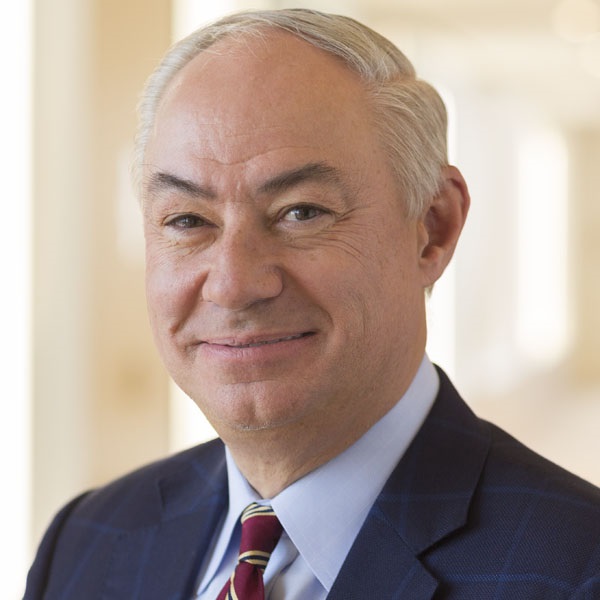Capital IdeasTM
Investment insights from Capital Group
Equity
The return of inflation and macroeconomic uncertainty is shaking up equity market leadership. We caught up with Grant Cambridge to discuss why including dividend growers as part of a wider portfolio could help investors dampen these risks, and how 25 years of investing at Capital Group has shaped his approach.
Why should investors review the case for dividend strategies right now?
Investors are facing a tough time currently given ongoing macroeconomic uncertainty and the accompanying financial market gyrations. Global economic growth is slowing down, developed market inflation is likely to stay high for longer than anticipated, interest rates are rising, and growth stocks have been severely punished, entering bear market territory.
With this level of uncertainty, I am focused on businesses that have demonstrated persistence in returning cash to shareholders, despite the uncertainties of the future. Their financial ability and willingness to return cash to shareholders have been tested under a variety of economic conditions. Those that have the robustness to avoid a dividend cut or decline in dividend per share growth, could have the makings of a long-term, resilient winner.
What makes dividend-growing companies unique?
Dividend growers are a particularly attractive subset of equities as they have produced higher returns with lower volatility over other dividend payers in the long term (see Figure 1). This risk-return advantage is reflective of their stronger fundamentals, healthy balance sheets, competitive positioning, and a commitment to shareholders. Today, many of these companies have record cash piles, creating a supportive environment for future payments and dividend growth. Some companies may also offer a special dividend. For example, CME Group has long offered a regular (recurring) growing dividend and excess cash to shareholders in the form of special dividends. However, we pay more attention to the former in our investment decisions even though these additional cash flows are attractive.
Identifying long-term, resilient dividend growers takes more than simply looking at stocks which offer the highest dividend yields. Extensive fundamental research is key.
Figure 1: Dividend growers have outpaced non-dividend payers over the long term
.png)
Past results are not a guarantee of future results
Data from 31 December 1989 to 31 December 2021. Returns for global universe are total returns in USD (with gross dividends reinvested) calculated as a weighted average of regional portfolio returns. The regional portfolios are all equal weighted and defined as the 1,000 largest companies in the respective MSCI IMI indexes for North America (50% weight), Europe (25%) and Japan (10%) and of the 500 largest companies in the Emerging Markets (10%) and Pacific ex Japan (5%) indexes. The universe constituents were rebalanced quarterly, and volatility is based on monthly returns. All companies comprising the global universe are split into dividend payers and non-dividend payers. A company was classified as a "dividend payer" if it paid a dividend during the previous 12 months. A company was classified as a "dividend grower" (a subset of payers) if its trailing 12-month dividend per share increased relative to one year earlier. Sources: Compustat, Worldscope via FactSet, MSCI, Capital Group
In 2021 our investment team engaged in over 21,000 company meetings1. These are paramount to understanding a firm’s capacity and commitment to pay and grow dividends over time. The perspectives gained from these interactions complement our deep quantitative research, which emphasises the sustainability of dividend payouts. All this on-the-ground research shapes the investment universe for strategies like Capital Group World Dividend Growers and Capital Group Capital Income Builder.
1. Source: Capital Group
Risk factors you should consider before investing:
- This material is not intended to provide investment advice or be considered a personal recommendation.
- The value of investments and income from them can go down as well as up and you may lose some or all of your initial investment.
- Past results are not a guide to future results.
- If the currency in which you invest strengthens against the currency in which the underlying investments of the fund are made, the value of your investment will decrease. Currency hedging seeks to limit this, but there is no guarantee that hedging will be totally successful.
- Depending on the strategy, risks may be associated with investing in fixed income, emerging markets and/or high-yield securities; emerging markets are volatile and may suffer from liquidity problems.
Our latest insights
-
-
Long-Term Investing
-
-
-
Economic Indicators
Past results are not predictive of results in future periods. It is not possible to invest directly in an index, which is unmanaged. The value of investments and income from them can go down as well as up and you may lose some or all of your initial investment. This information is not intended to provide investment, tax or other advice, or to be a solicitation to buy or sell any securities.
Statements attributed to an individual represent the opinions of that individual as of the date published and do not necessarily reflect the opinions of Capital Group or its affiliates. All information is as at the date indicated unless otherwise stated. Some information may have been obtained from third parties, and as such the reliability of that information is not guaranteed.
Capital Group manages equity assets through three investment groups. These groups make investment and proxy voting decisions independently. Fixed income investment professionals provide fixed income research and investment management across the Capital organisation; however, for securities with equity characteristics, they act solely on behalf of one of the three equity investment groups.
 Grant Cambridge
Grant Cambridge